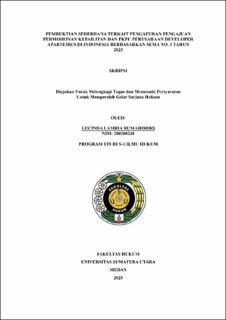| dc.description.abstract | As Indonesia's population continues to grow, the need for housing is also increasing, so land is getting smaller and land prices are rising. As a solution, vertical housing development, such as apartments or flats, is an alternative. Apartments, which are regulated in Law No. 20/2011 on Flats, are multi-storey buildings divided into units that can be owned and used separately. However, the apartment development process often faces obstacles, especially financial issues, which can hinder the smooth running of the project. One solution to this problem is through the Postponement of Obligation to Pay Debt or Bankruptcy. However, the issuance of the Supreme Court Circular Letter or SEMA No. 3 of 2023 concerning the Implementation of the Formulation of the Results of the Plenary Meeting of the Supreme Court Chamber in 2023 as Guidelines for the Implementation of Duties for Courts which in the Formulation of the Law of the Special Civil Chamber in number 2 states that apartment developer companies do not meet the requirements of simple proof so that they cannot be filed for bankruptcy. This is certainly a problem. This arrangement limits the freedom of judges in interpreting the law.
The method used in writing this thesis is the normative juridical research method, which is a method that refers to legal norms carried out by means of literature studies in order to obtain secondary data in the form of primary, secondary, and tertiary legal materials related to the problems studied, this research has a descriptive nature.
The research resulted in several important conclusions. Regulations regarding the bankruptcy of developer companies that do not meet the requirements of simple proof are not clear and firm regarding their implementation. The absence of a firm regulation creates problems in its implementation. However, in practice, due to SEMA's position as a policy regulation, then based on the freedom of judge, judges can still use their own interpretation and make SEMA as guidelines and directions. Therefore, it is necessary to affirm the regulation on bankruptcy and PKPU. | en_US |


